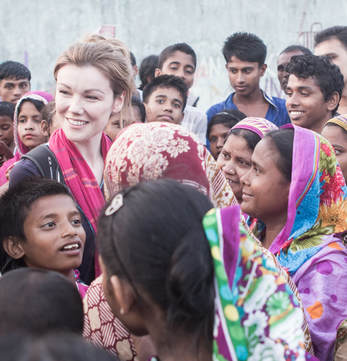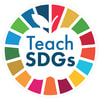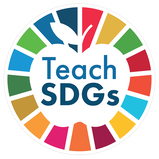How voices from the frontline of climate change in Bangladesh are teaching secondary school pupils9/3/2018
© iStockphoto.com/MachineHeadz
By Dr. Joanne Jordan, @JoanneCJordan
Since my first trip to Bangladesh in 2008, I have lost count of the number of times I have been asked the same question by those I interview as part of my research: "Will you tell our story so people know how we live?" The Lived Experience of Climate Change Project emerged from an attempt to do just that, to engage the "voices of low-income people" to ensure that diverse publics are better informed of their needs and priorities. For my research looking at urban climate resilience and how land tenure affects adaptation to climate change, I spent months in the Duaripara informal settlement in North-west Dhaka talking to over 600 people in their homes, workplaces, and local teashops and on street corners to understand how climate change affects their everyday lives and what solutions they employ.
By turning their testimonies into interactive theatre performances, documentary film, educational programmes, and public events aimed at a wide range of people, we were able to fully engage affected communities in the research findings and build awareness and action on the everyday realities and impacts of climate change on low-income people in Dhaka.
The use of accessible and entertaining engagement activities helped animate and make the needs and priorities of low-income people much clearer, and it meant that I was able to reach a very diverse range of people nationally and internationally with varying levels of knowledge on climate change, education, literacy, and language skills. Free Teaching and Learning Resources Enhancing people’s awareness and knowledge about the global effects of climate change is essential for catalysing a response. Education equips young people with the information and skills required to make informed decisions and take responsible actions. Climate change education formalised within the Action for Climate Change Empowerment agenda of the United Nations Framework Convention on Climate Change urges countries to enhance learning on climate change through public awareness and curricula. The Lived Experience of Climate Change centered on the involvement of students as part of a broader teaching and learning strategy. The project worked with the University of Dhaka to integrate the performance theatre project into their MA programme. I also used video outputs from the project as teaching resources for MSc programmes at the University of Manchester, and we worked with Year 13 BTEC Performing Arts students from Regents High School in London to re-enact key scenes from the theatre performance at public events in the UK. The project has recently developed teaching resources to give secondary school geography teachers in the UK and Ireland support to teach pupils about climate change and help young people develop the knowledge and skills to think critically about climate change in an urbanising world. Climate Change in Urban Areas: Bangladesh Case study has been designed to achieve impacts on learning outcomes, attitudinal shifts, and behaviour change. The resources translate research into classroom sessions around the everyday realities and impact of climate change on the lives of low-income people in Dhaka. Using videos, powerful images and comprehensive background information, students can explore the impact of climate change on low-income people and understand the different social, economic and environmental factors involved. To accompany the teaching resources, a mini film series funded by the Arts and Humanities Research Council’s Research in Film Awards was recently launched, where three residents from Duaripara, Rohima, Nasrul and Sufia, directly convey their own stories and experiences in the series "Living on the Frontlines of Climate Change."
Upon completion of the sessions, students are expected to gain an understanding of both the effects of climate change in Bangladesh and how the effects of climate change impact the lives of low-income people in Bangladesh. Students are actively encouraged to reflect on their own attitudes and behaviours in a range of individual and group activities. The teaching resources have been approved by a range of organisations that enhance and support young people’s geographical and global learning development, including the Royal Geographical Society, Geographical Association, Global Dimension, Geographical Society of Ireland, and Association of Geography Teachers of Ireland. For further information on the project: Web: https://bit.ly/GDIpotgan Twitter: #GDIpotgan@JoanneCJordan Facebook: http://bit.ly/GDIpotganFacebook YouTube: https://bit.ly/GDIpotganYouTube Email: [email protected]k 
Dr Joanne Jordan is an environmental social scientist with over 10 years of experience as a researcher on climate change adaptation. Much of this work is based on intensive empirical research at the local level, mostly in Bangladesh and more recently, India. She specialises in climate change resilience and vulnerability, risk perception and culture, and climate change communication and knowledge exchange for impact.
Dr. Jordan is an Independent Research Consultant, Honorary Research Fellow at the University of Manchester, and a Visiting Researcher at the International Centre for Climate Change and Development. Prior to this she was a Lecturer at the University of Manchester, a Post-doctorate Research Fellow at the Institute for Sustainable Development and International Relations at Sciences Po in Paris, a Research Assistant at Queen’s University Belfast, and has worked at a range of not-for-profit organisations in Cambodia, Peru and Belize.You can connect with Dr. Jordan on Twitter at @JoanneCJordan. Comments are closed.
|
AuthorSTeachSDGs Team & Contributors Archives
November 2019
Categories |




 RSS Feed
RSS Feed